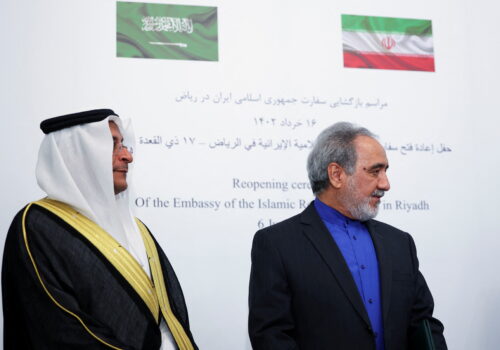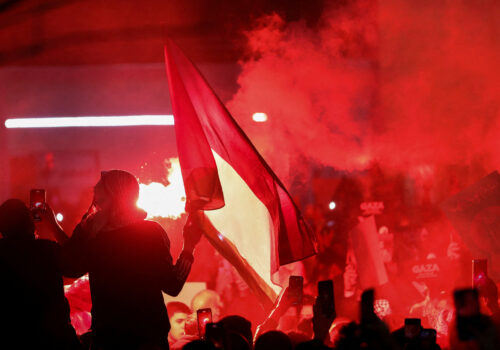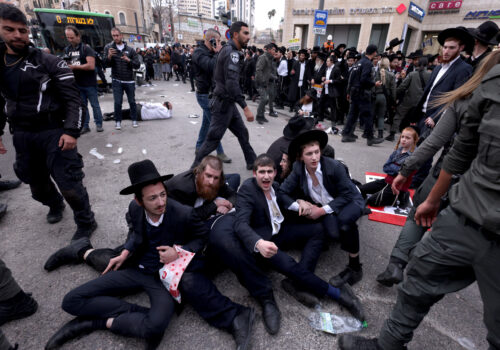Most GCC states condemned the attack on the Iranian embassy complex in Syria. An escalation is what they fear most.
From the perspective of many governments around the world, Israel moved up the escalation ladder when it razed Iran’s embassy annex in Damascus on April 1. This airstrike killed Mohammad Reza Zahedi, a top Islamic Revolutionary Guards Corps (IRGC) commander, in addition to at least six others in the IRGC’s elite Quds Force, its foreign arm. Given that this diplomatic facility was, according to international law, on Iranian soil and that Zahedi was the IRGC’s highest-ranking commander to be killed since Qasem Soleimani’s assassination in early 2020, this attack intensified the “shadow war” between Israel and Iran.
Interestingly, the first country to condemn the airstrike was the United Arab Emirates (UAE). Shortly after the attack occurred, the Emirati foreign ministry released a statement “[condemning] the targeting of the Iranian diplomatic mission in the Syrian capital, Damascus.” Then, four other Gulf Cooperation Council (GCC) members—Kuwait, Oman, Qatar, and Saudi Arabia—also denounced the attack, with Bahrain the exception. This was unlike after Soleimani’s assassination when GCC states, especially Oman and Qatar, called for de-escalation between Washington and Tehran. Still, no Arab monarchy in the Persian Gulf outright condemned the killing of Soleimani.
Unknowns of Iranian retaliation
The leadership in Abu Dhabi has grave concerns about being caught up in any escalation of regional hostilities, which have been exacerbated since the Gaza war began in October 2023 and spread to Lebanon, Yemen, and elsewhere. The fact that the UAE normalized relations with Israel in 2020 via the Abraham Accords leaves the Persian Gulf country increasingly vulnerable to the Middle East’s conflict dynamics.
SIGN UP FOR THIS WEEK IN THE MIDEAST NEWSLETTER
The UAE has reason to fear Iran-backed actors in the Arab world, particularly in light of the Houthi drone and missile attacks against Abu Dhabi in 2022. Today, the UAE—with an Israeli embassy in Abu Dhabi and a consulate in Dubai, Israeli tourists in Dubai, and Israeli businesspeople and expatriates in the country—does not want Tehran targeting Israeli diplomats, citizens, or interests on Emirati soil in retaliation for the April 1 attack in Damascus. As Dubai is a popular tourism destination and a Middle Eastern hub for finance and business, the UAE’s brand depends heavily on peace and stability.
By quickly condemning Israel’s airstrike against Iran’s diplomatic facility in Damascus, the leadership in Abu Dhabi was able to send a strong message to Iran and various Tehran-backed groups in the Middle East. Despite the UAE normalizing relations with Israel and refusing to abrogate the Abraham Accords in response to Israel’s conduct in Gaza since October 2023, Abu Dhabi is increasingly confident and vocal in criticizing certain Israeli actions.
The UAE’s swift condemnation of Israel’s killing of six international World Central Kitchen workers in an airstrike on April 2, as well as the strong language regarding the Gaza war from the UAE during its time as a non-permanent member of the United Nations Security Council (UNSC), further underscores this point. Although Algeria—which replaced the UAE as the only Arab state sitting on the UNSC on January 2—has a far more adversarial relationship with Israel, the UAE repeatedly condemned Israel’s actions in Gaza while it had a seat on the body. Within the war’s first month, the UAE ambassador to the UN, Lana Nusseibeh, addressed Israel’s “dangerous, unrealistic evacuation orders” and declared that Israel’s killing of Palestinian children in Gaza “should stain our moral conscience if nothing else does” while speaking at the UNSC.
In a grander context, the UAE is attempting to conduct an increasingly nonaligned—or, perhaps more accurately, multi-aligned—approach to geopolitics. This entails Abu Dhabi striving to maintain positive ties with a host of countries in the Middle East—Iran, Israel, Syria, Qatar, and Turkey—as well as all five permanent members of the UNSC. Ultimately, as US hegemony steadily declines, the UAE strives to shore up relationships with states in the neighborhood that have been on historically negative terms with Abu Dhabi, including Iran. At the same time, the UAE is diversifying its global partnerships by deepening ties with Beijing and Moscow.
Such a foreign policy requires the Emiratis to strike a delicate balancing act. In terms of Abu Dhabi’s reaction to Israel’s April 1 airstrike, this consisted of the UAE condemning the attack without ever mentioning Israel. In doing so, Abu Dhabi signaled its disapproval of Israel’s illegal bombing of a diplomatic mission without appearing to align with the Iran-led Resistance Axis.
Dangerous ripple effects
Five of the GCC’s six members quickly condemned this attack on Iran’s diplomatic facility in Damascus, which occurred against the backdrop of Gulf Arab officials taking diplomatic steps aimed at ending the Gaza war as soon as possible. With the war further regionalizing, policymakers in Abu Dhabi, Riyadh, and other GCC capitals fear spillover into the Persian Gulf and Strait of Hormuz. This scenario could severely harm their countries’ economies and threaten their security.
Saudi Arabia, which has not normalized relations with Israel but took a host of small steps in that direction before October 7, 2023, embraced the same approach as the UAE in terms of responding to Israel’s April 1 attack against Iran’s embassy complex in Syria. Riyadh reacted by putting out a statement expressing its “categorical rejection of targeting diplomatic facilities for any justification, and under any pretext, which is a violation of international diplomatic laws and the rules of diplomatic immunity.” Yet, at no point has Saudi Arabia officially called out Israel by name for this airstrike, despite Riyadh consistently condemning Israel for its conduct in Gaza throughout this war.
One reason why further expansion of the Gaza war unsettles officials in Abu Dhabi and Riyadh is that they remain deeply suspicious of Tehran. This is despite their détente with Iran following the UAE’s diplomatic outreach to Tehran and the return of its ambassador to Iran in 2019 and 2022, respectively, and Saudi Arabia’s renormalization of diplomatic relations with the Islamic Republic in 2023. Leaders in both the UAE and Saudi Arabia fear Tehran’s capacity to foment turmoil on Emirati and Saudi soil if Iran’s leadership comes to see GCC states supporting Israeli adventurism in the Middle East that targets Iranians and Iranian interests.
Sometimes referred to as the GCC’s “doves,” Kuwait, Oman, and Qatar perceive Iran as much less of a threat than other GCC members do. Over the past three decades, Oman and Qatar have played critical bridging roles between the West and Tehran. Since October 2023, Kuwait City, Muscat, and Doha have used strong language to condemn Israel’s war against Gaza. Notably, Kuwait, which is said to be the most anti-Israeli GCC member, was the only Gulf Arab monarchy to call out Israel by name when condemning the April 1 airstrike.
Fearful that hostilities between Israel and Iran could spiral out of control, the GCC states are keen to avoid the heat as much as possible.
As Israel ratchets up tensions with Iran, Abu Dhabi, Riyadh, and other GCC capitals want Tehran to know that they have nothing to do with such Israeli behavior and are on record condemning it. At this point, the UAE, Saudi Arabia, and other GCC members have significant fears about how the continuation of the Gaza war and its spillover effects threaten their national interests. For a host of reasons, including their domestic purposes, Gulf Arab states desperately want a ceasefire implemented immediately.
Giorgio Cafiero is the chief executive officer of Gulf State Analytics, a Washington, DC-based geopolitical risk consultancy, and an adjunct assistant professor at Georgetown University.
Further reading
Wed, Mar 6, 2024
A year ago, Beijing brokered an Iran-Saudi deal. How does détente look today?
IranSource By Giorgio Cafiero
Tehran and Riyadh saw dialogue as the only viable way to reduce tensions, and realized that further escalating hostilities would not advance either’s national interest.
Wed, Apr 3, 2024
Jordan was already walking a tightrope. Then the Gaza war happened.
MENASource By Aaron Magid
Around six months into the war, many Jordanians have not been satisfied with their government’s response to the Gaza war.
Thu, Mar 14, 2024
Heaven can’t wait: Are Israel’s Haredi parties about to bring Netanyahu down?
MENASource By Shalom Lipner
Bringing this clash to its latest boil is a fast-approaching April 1 deadline for the Knesset to approve new legislation that would regulate the Haredi exclusion from the IDF draft.
Image: Wafaa Badawi, university professor, stands in her kitchen overlooking Iran’s consulate, after a suspected Israeli strike on Monday on the consulate, adjacent to the main Iranian embassy building, which Iran said had killed seven military personnel including two key figures in the Quds Force, in the Syrian capital Damascus, Syria April 2, 2024. REUTERS/Firas Makdesi


